World War II’s Secret Weapon: Propaganda in Film
World War two was the war that sent men overseas and sent women to the factories of America to work the jobs men left behind. It seemed that every American wanted to contribute to the war. Men were willing to fight, women were willing to work, war bonds were being purchased left and right, people were even more than happy to ration food. So, the question is how did the United States get what seemed like every American citizen to contribute to the war effort in one way or another? The answer is propaganda and a lot of it. Propaganda is information of a biased or misleading nature used to promote or publicize a particular political cause or point of view. In the case of WWII, the government was using propaganda to get every American on board with the war. Everywhere people looked there was propaganda. There were posters on every lamp post that read things such as “help the troops, buy war bonds”. It was in TV shows, commercials, and on the radio. Even Donald Duck contributed to the propaganda.
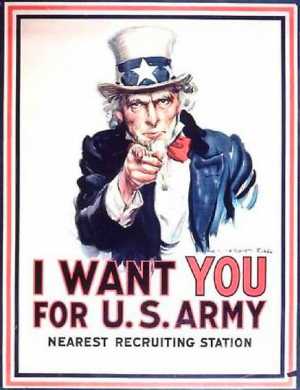
Propaganda was most prevalent though in the Hollywood movies that came out during the war. The movies consisted of “propaganda themes” that aimed at influencing the American people and their view of the war. These themes were powerful weapons that not only motivated the troops to fight, but spread hatred of the Nazis and the Japanese. The propaganda consisted of six main themes: The Nature of the Enemy, The Nature of the Allies, The Need to Work, The Need to Fight, The Need to Sacrifice, and The Americans-What we are fighting for. These themes aimed to target every American in some way or another. Hollywood used these themes combined with well-known actors, such as Cary Grant, to influence the American people. Thus, how did Hollywood movies use propaganda themes to influence the American people, and ultimately influence the outcome of War World II.
The Nature of the Enemy
The most common propaganda theme used in the films made during WWII was the nature of the enemy. Throughout the films stereotypes of Nazis and Japanese were used to spread racism and hatred for the enemy. Characters in the film commonly used offensive language. The goal of this was to make Americans hate the enemy so much that they were willing to do anything to help the United States defeat them. In addition, the United States government wanted to get all Americans on their side so that they wouldn’t care what the United States did in order to win, as long as the enemy was defeated.
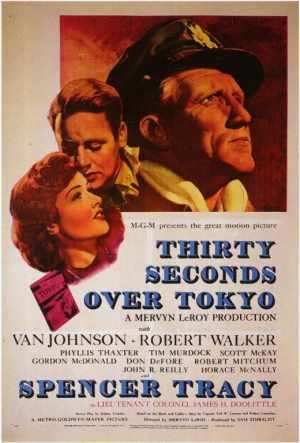
In popular movies, such as Thirty Seconds Over Tokyo and Destination Tokyo the Japanese are referred to as “Japs” throughout the films. It was often said casually and could be missed by a viewer if one wasn’t paying much attention. It wasn’t how it was said, but it was how many times it was said and the underlying racism that is accompanied by it. The repetitive saying of the word “Jap” stuck in American’s minds and soon every American was referring to the Japanese as “Japs” whether they were the enemy or simply an innocent Japanese-American. The word “Jap” quickly became commonplace in America and became racially charged and derogative toward the Japanese. The Japanese were not the only enemy targeted in American propaganda films. The Nazis were often depicted as controlling and power hungry. The goal of propaganda aimed at the Nazis was different than propaganda aimed at the Japanese. The goal of Japanese propaganda was to spread racism and make Americans hate all Japanese. The goal of propaganda aimed at the Nazis was to make Nazis look brutal and controlling so that American’s would feel bad for the innocent Germans that were not a part of the Nazis. They wanted Americans to want to defeat the Nazis so that the innocent Germans could be free of Nazi control.
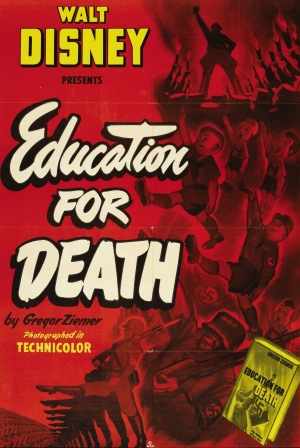
In the short film by Walt Disney, Education for Death: the making of the Nazi, Nazi’s are depicted as controlling every aspect of the German’s lives. The film showed the Nazis having to approve of the name a person was going to name their baby and it showed new parents having to bring paperwork and birth certificates from generations before to prove that the child was pure Aryan. The film also showed Nazis brainwashing children in schools by making them believe that there is no room for weaklings and that Germans are a superior race. This type of propaganda made Americans feel bad for Germans because they began to believe that it wasn’t their fault because they were being brainwashed by the Nazis. The nature of the enemy theme was extremely effective in rallying Americans behind the war. It made American’s want to defeat the Japanese because they were all bad people and it made American’s want to defeat the Nazis because they were controlling and brainwashing the innocent Germans.
The propaganda led to so much hatred and even some fear. The fear and hatred led to the mistreatment of Japanese on American soil. Japanese-Americans were forced to be held in internment camps for the duration of the war because of fears that they were spies for the Japanese Empire. This shows just how much hatred and fear the propaganda instilled in Americans. The fear and hatred propelled Americans to help in the war effort because there was nothing else the American people wanted more than to defeat and crush the Nazis and Japanese.
The Nature of Our Allies
One of the less used, but equally effective themes of propaganda used by the United States was, the nature of our allies. The goal of this theme was to unite Americans to our allies of Britain, Russia, and China. The United States wanted Americans to feel a sense of unity with our allies and show that they have the United States back. The propaganda shows that together there was no way that our enemies could defeat us. In the film, Thirty Seconds Over Tokyo, it is discussed that when the fighter pilots are flying to bomb Japan they will first land in China in order to be gassed up before flying to complete their mission in Japan.
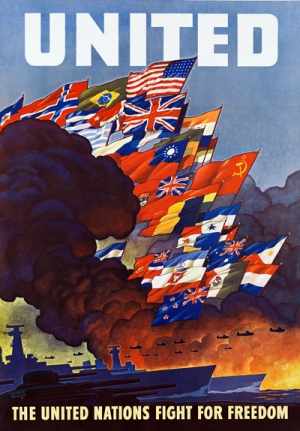
Most people wouldn’t even think twice after hearing the plan between the general and the fighter pilots, but American people during WWII heard these subtle propaganda messages so often that it really made them believe that all of our allies were more than willing to help the United States win the war and together there would be no way that the Allies could lose to the Axis powers of Germany, Japan, and Italy. The United States wanted people to think of the war as the Allies vs. the Axis and not the United States vs. Germany and Japan. The government wanted their to be a sense of unity between the countries to make Americans believe that with all of these countries working together there is no way that the Allies can lose.
The Need to Work
The next propaganda theme was mainly focused on the American women. The theme, the need to work showed women that they can help in the war effort by working the factory jobs that the men who went overseas to fight left behind. Women gained the most equality to men that they have ever had, because the men had left and in order to win the war the women would have to step up and do the jobs that the men previously had done. In the film, Thirty Seconds over Tokyo, the wives of the fighter pilots who went off to war are talking and one of them says that she is going to get a job in a defense factory because “she couldn’t imagine just sitting around in her house doing nothing”. The goal of this was to have women watching the film realize that if this character could work in a factory, so could they. The government wanted as many women as possible to work in factories so that materials for the war could be made rapidly. There were even films made that directly targeted women. One of these films was Women in Defense.
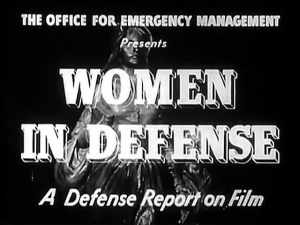
Women in Defense was a short film produced by the Office of Emergency Management. It was written by the First Lady Eleanor Roosevelt and narrated by popular actress Katharine Hepburn. The goal of the film was to show women that they could help with the war effort and that their efforts were making a difference in the war. The film said things such as, “Every woman has an important place in the National Defense Program, in science, in industry, and in the home”, and “Woman should be asking “what can I do to help””. The films made women feel more important than ever. It made them feel like they could make a difference, something that they had never had the opportunity to do before. Without the women working in the factories the government knew that the United States wouldn’t be able to manufacture all the goods and weapons needed for the war effort. They focused a lot of time and money to encourage women to go to work because without them winning the war would have been much harder.
The Need to Fight
The most crucial propaganda theme was the need to fight. Without men willing to risk their lives fighting overseas there would be absolutely no way that the United States and the Allies could win the war and defeat the Axis powers. The government had to convince millions of American men to leave their families and safety behind to fight in a bloody and dangerous war. Yes, there was a draft and the government forced men to go to war, but it is a lot easier to win when the troops believe in what they are fighting for and voluntarily decide to fight for their country. The film Why We Fight: War Comes to America, was aimed at showing men what they were fighting for and why it was an honor to defend the great nation of the United States of America.
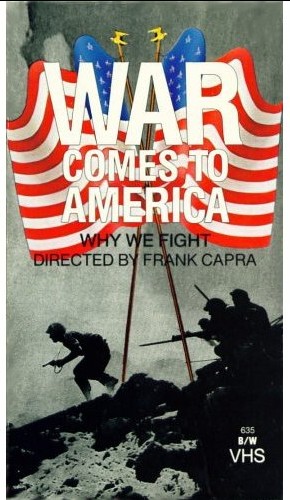
The film used techniques such as nostalgic analogies to remind people of the challenges that America has faced before and how they were overcome because of brave men. The film discussed the settling of America at Plymouth Rock and the building of the colonies. It than talked about how America has already faced challenges to our freedoms by way of Great Britain and how brave men fought in the American Revolution to defend those freedoms. It showed that because of those brave men America won and because America won America was able to thrive and become a great nation with advanced medicine, school systems, and technology.
The goal of this type of propaganda was to show men and Americans as a whole that the country had faced challenges before, but the country had risen up and overcame the challenges and achieved great things in the aftermath. They wanted Americans to believe that great things would come after the war if the United States was able to win. Another technique that was used was to say that the soldiers were fighting for their country and for more than their country; they were fighting for an idea bigger than their country. They were fighting for freedom, equality, and democracy. The government made the war larger than life and wanted the troops to think that they were fighting for more than just defeating the enemy. They wanted them to believe that they were fighting for the wellbeing of the whole world.
The propaganda led to a mass number of American men from all walks of life going to the recruiting stations and enlisting in all branches of the military. If you were an able-bodied male, you wanted to do your part in the war. Men were more than happy to serve their country. Over six million American men volunteered to fight in a war that spread across Europe and in the Pacific even though they knew that there was a chance that they would not make it back home. The propaganda had served its purpose and in this case, may have been a major weapon in the allied victory. Without the propaganda millions of men wouldn’t have enlisted in the army and more men would have had to be drafted and the higher number of men drafted the lower the approval rating of the war. If the troops themselves didn’t believe in what they were fighting for than the outcome of the war may have been very different.
The Need to Sacrifice
On the Home front Americans had to ration food and go without luxuries that they once had. The government had to make Americans realize that by them sacrificing, they were helping the war effort. The propaganda theme of the need to sacrifice aimed at convincing Americans at home that in order for the United States to have the best chance of winning they would have to sacrifice foods such as butter, meat, cheese, jams and fruit and luxuries such as bicycles and typewriters. Women were often the faces of propaganda that called for rationing of goods. There were slogans such as “help our men, ration your food”.
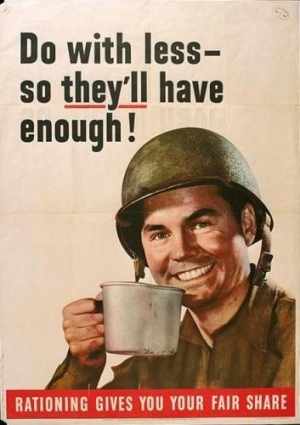
In the film, Destination Tokyo, the captain is writing a letter to his wife explaining how his son will not be able to get a toy train for Christmas because “we are in a war”. He continues on in the letter by saying that his son will understand and that it is worth his son not getting a toy one Christmas so that the United States can win the war. He then goes on to write that next Christmas will be better. The message of this part of the movie was to show the American people that rationing was a part of war and that it won’t last for long. It is better to ration now so that the war will be over faster. People became accustomed to the rationing and no longer minded doing so because they knew that it was helping with the war effort. The rationing was allowing for factories that normally were not used for military needs to manufacture goods for the war. It also allowed for goods to be sent overseas to the soldiers who needed them. The propaganda for rationing was definitely not as intense as the other themes of propaganda. Rationing helped the war, but it was not as imperative as improving morale and getting men to enlist in the military. The government put time into this propaganda, but not nearly as much time and money as the other themes.
The Americas-What we are Fighting for
The last propaganda theme utilized by the government during World War II was the Americas-what we are fighting for. The goal of this theme was to remind Americans that the United States is fighting for more than just victory. The United States was fighting for the four freedoms, democracy, the principles of the Atlantic Charter, and an end to discrimination. The film, Destination Tokyo, contained a plethora of this propaganda theme.
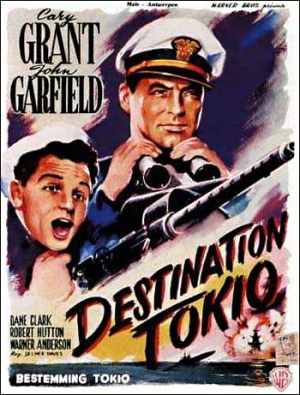
The crew members of the submarine discuss the war’s “bigger picture” throughout film. They talk about how they are not just fighting for the freedoms and the democracy of the Allies, they are fighting for the freedom of all people, Japanese and Germans included. Later in the film they discuss Japan’s failed attempt at democracy and how it didn’t work because the people do not “have a voice”. This propaganda was aimed at both the Home front and at the troops. The government wanted the troops to truly believe that they were fighting for the freedom of all people. If the troops believed that they were helping the world become a better place than their morale would be higher and it would help them fight harder in the war. It was important for the troops to know that they were fighting for something larger than themselves. The troops needed to know that they were not just fighting because the United States got attacked.
The theme of family was also used to remind troops that they were fighting for their wives and children that were back in America. In Destination Tokyo, one of the crewmen listens to a record of his wife telling him how much she and their kids missed him. The government wanted to play on the troops sensitive side and remind them that they are fighting for their children’s futures. This propaganda theme was found everywhere during the war. Its main goal was to boost troop morale and keep them believing in what they were fighting for. It sent a powerful message to troops and may have influenced the outcome of the war. Without high morale, the war may have swayed in favor of the Axis powers and it could be a totally different world today.
Lasting Impact
Propaganda was everywhere you looked during World War II. It was meant to influence people’s thoughts and actions; and it did. Whether you agree with the use of propaganda or disagree with the usage it is hard to argue with its effectiveness during World War II. It created hate for the enemy, formed unity between the allies, empowered women to work in factories, brought out the bravery and courage in men, convinced people to ration, and made troops believe in what they were fighting for. Its effectiveness was indisputable and propaganda became a weapon during this period. In no other war had the use of propaganda played such a role. Whether or not propaganda directly led to an Allied victory, it can be said that it helped and may have swayed the war in the Allies favor. The propaganda during the war created an atmosphere in America that has not been equaled. Almost every American was on board with the war and more than willing to do whatever it took to win the war. Having so many people backing the war made a difference. It led to increased enlistment, increased production of war materials and equally as important increase morale.
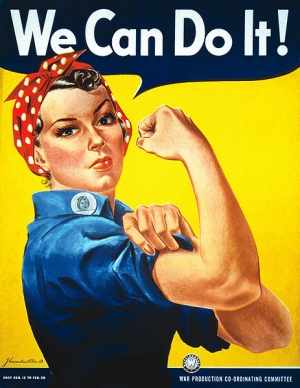
Americans believed that there was no way that the United States and the Allies could lose. Believing in oneself is a crucial part of achieving anything in any sense. If one believes that they are going to lose than they are not going to work as hard. Propaganda was a secret weapon for the United States. The Axis powers, such as Germany used propaganda, but it was not to the extent or as effective as the United States. The United States put so much time and effort into it that it became just as important as a tank. Propaganda took on a life of its own and without it the war may have ended much differently. It is hard to completely understand the full effect of propaganda during the time having not lived through it, but it is not hard to say that it made a difference on the Home front and it made a difference to the troops morale. Those two things are important aspects of any war and that leads to the idea that propaganda was an important weapon in the war that may or may not have changed the course of history.
Works Cited
Bird, William L., Jr., and Harry Rubenstein. “Every Citizen a Soldier:World War II Posters on the American Homefront.” The Journal of The Gilder Lehrman Institute. The Gilder Lehrman Institute of American HIstory, www.gilderlehrman.org/history-by-era/world-war-ii/essays/every-citizen-soldier-world-war-ii-posters-american-home-front. Accessed 23 Nov. 2016.
Destination Tokyo. Directed by Delmer Daves, produced by Jack L. Warner and Jerry Wald, screenplay by Steve Fisher, Albert Maltz, and Delmer Daves, performance by Cary Grant, Warner Bros, 1943.
Education For Death:The Making of the Nazi. Directed by Clyde Geronimi, narrated by Art Smith, screenplay by Gregor Ziemer, Walt Disney Productions, 1943.
Thirty Seconds Over Tokyo. Directed by Mervyn LeRoy, screenplay by Dalton Trumbo, performance by Van Johnson and Spencer Tracy, Metro-Goldwyn-Mayer, 1944.
Why We Fight: War Comes to America. Directed by Frank Capra and Anatole Litvak, performance by Walter Huston and Lloyd Nolan, produced by Frank Capra, US Army Pictorial Services, 1945.
Women in Defense. Directed by John Ford, narrated by Katharine Hepburn, screenplay by Eleanor Roosevelt, Office of Emergency Management, 1941.
What do you think? Leave a comment.











It’s not surprising that Disney created propaganda films. All of Hollywood got in on that. These were pretty good, and amusing.
It wouldn’t be until after the war that true victories would be documented and a more realistic perspective of the casualties and cruelties of war would be understood.
They really heightened the spirit of “patriotism” in the American people.
The movies framed the war using a now-familiar good vs. evil narrative, while ironically glossing over certain inconvenient truths about the United States’ allies.
Great article. Comics were not an exception to American propaganda either. Many comics had common themes among them associated with the war effort whether that be the characters fighting Axis Powers or purchasing war bonds, production, etc.
During war every possible means of propaganda are used! A lot of propaganda is constantly used when there is not a war, in case of one, a World War nonetheless, the need for propaganda increases exponentially!
Disney was not exception, and it was done in a very entertaining manner too! Very good work actually!
Hollywood’s World War II movies gave audiences a full-length mirror that reflected their society, values, beliefs, and place in history.
The hallmark effort of this must be the Why We Fight series.
It is interesting to see how censorship and propaganda are common worldwide, and especially during war time.
United States really ramped up the propaganda to get the public behind the war effort and to unite the country.
Nice read. Even after the war was over, films continued to show a very skewed view of the war, glorifying the efforts of the soldiers to show that their sacrifice was worth it.
Good job. Surprised Casablanca wasn’t referenced!
Poor Donald! No wonder he acts an ass in later cartoons- he was traumatized by war!
Propaganda played a huge part in World War II for Germany and The United States and the power to control such a great tool was the greatest weapon both countries could have ever used.
The government worked with the Hollywood industry to use film as propaganda during World War II. The same thing is happening now.
Propaganda was a very powerful tool for each country that used it during World War II.
Nice job. The anti-Japanese posters depicted the “Japs” with squinty eyes and Dracula-like fangs.
Donald Duck, and Mickey Mouse weren’t just about entertainment it seems!
Most things just aren’t.
Movies during this period in time helped to keep the American peoples patriotic spirits up and provided them the justification necessary to support the defeat of the “axis of evil”.
The power of visual media was and still is profound, and the amazement of new media which was felt by citizens during WW2 made film very powerful in influencing and shaping public opinion.
Lots of good information here, but I don’t think any of that content was on television during WWII.
These films would influence the entry of the United States into the war and support our military effort when finally involved.
propaganda isn’t just in film. today we see it in our news, online media and basically everywhere else. world war II was just the beginning.
The Second World War was, when filmed propaganda came into its own, one of the reasons why the Government was determined to keep the country’s cinemas open.
This is a very interesting topic and I really liked the way you explained the different propaganda messages in these films. I think follow-ups to this piece could look into how well received these films were and how many people saw them. That could support your claims that many Americans were swayed by cinema to enlist, work, and support the war effort.
Even much later, fims are still being used by many governments to brainwash people into accepting their ideologies…
Ideologies are most certainly used to “brainwash” people or condition the general population to a particular paradigm. Hollywood in particular has a long history of this and has succumb to state infiltration from the CIA and other organizations. Americans love movies and so what better way to train our minds to accept who are the good guys and who are the bad guys and accept a narrative that promotes purported American values and beliefs.
I agree with this being an interesting topic and very well executed explanation.
Propaganda has been a major tool utilised by governments around the world to promote their own ideologies in times of conflict. Following WWII propaganda skyrocketed and became a hallmark of the Cold War, particularly in the US. It infiltrated all aspects if popular culture, including, but not limited to, the James Bond franchise (think From Russia With Love etc.). Propaganda from this era provides a visual timeline of the values of a nation and how these values were informed by and changed due to the political climate and actions of neighbouring countries.
Something that I think could be added to this discussion is how propaganda had to work with real-world events to be as effective as it was in WW2. The American government was selling the war effort to a public that wanted retribution having just witnessed the Pearl Harbour attacks. I believe that this, rather that the propaganda alone, is what made their messaging so effective.
In the case of the Second World War, propaganda movies might have helped to get people to buy war bonds but the Japanese attack on Pearl Harbor cannot be ignored. When I was young every year on December 7th my mother just seemed to have a moment where she would remember where she was, who she was with, everything about that moment: My father joined the Army. Both of the my parents talked about a mood in the country, I don’t remember them talking about the influence of movies. I grew up in the 1950s watching these movies with my mother on TV, I don’t remember my father wanting to watch them. I never got the impression the movies had much of an influence on her. She, along with lots of other women, worked in war plants. I got the feeling that working alongside other wives who husbands were fighting the Germans or the Japanese had a big impact. Maybe the impact of propaganda movies needs to be understood within a certain context: Where they might work and might not have as much influence (John Wayne in the Green Berets probably did not have much propaganda value during the Vietnam War).
The left loves to conflate patriotism with propaganda.
This raunchy little article starts off with:
“It seemed that every American wanted to contribute to the war. Men were willing to fight, women were willing to work, war bonds were being purchased left and right, people were even more than happy to ration food. So, the question is how did the United States get what seemed like every American citizen to contribute to the war effort in one way or another? The answer is propaganda and a lot of it. Propaganda is information of a biased or misleading nature used to promote or publicize a particular political cause or point of view.”
Men want off to war and signed up for it after we were attacked at Pearl Harbor. Women went off to work in plants and men that were not physically able to fight did what they could back home. And they did it out of a sense of love and patriotic duty for this country. Not because they watched some “propaganda film”.
I had 7 uncles and they all signed up for war, none of them were drafted. My uncle Will’s army unity went up through Italy after Patton and he saw half his unit killed by fire right in front of him. My uncle Ted was in the Navy, his ship was hit and he spent almost two days in the water before being rescued, left the hospital early, and nine months later was on another ship, saw a group of crew mates incinerated on deck, and was on that ship when it sunk. All my other uncles served. And yeah, the enemy WAS called names like Japs. Political correctness was not in play. I would imagine some called them worse names.
So American people wanted to see movies that painted Americans as the heroes they were? Nice that their contributions, including deaths, are so appreciated by idiots like this author who can write such material with sneering indifference to the realities of the time. Oh dear, they referred to them as Japs! Maybe someone even used…OMG…the word NIP! Never mind that absolute atrocities that the Japanese and the Germans did to millions of europeans and Chinese, not to mention American POWs.
People that lap this pablum up have a warped sense of what the Greatest Generation did for this country, and the freedom of the world.